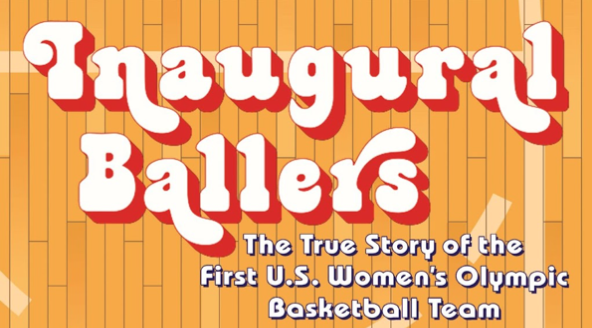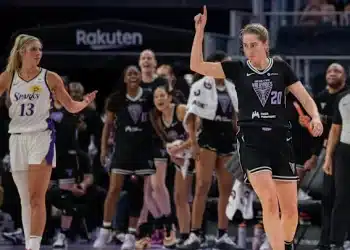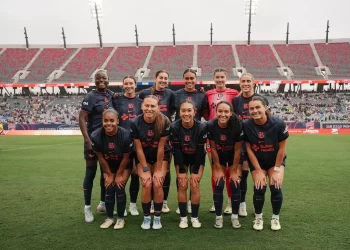By: Zachary Draves
As 2022 comes to a close, I felt as if I would take this time to go against my usual approach to sports writing while in keeping with my key focus areas of sports, history, social justice, and society. Therefore, I want to write about my pick for the best sports book of the year and the honor goes to:
Inaugural Ballers: The True Story of the First US Women’s Olympic Basketball Team by my friend, mentor, and New York Times Best Selling Author Andrew Maraniss.
(Courtesy: Penguin Random House)
It tells the story of the 1976 US Women’s Olympic Basketball team that featured future hardwood heroines including Nancy Lieberman, Lucia Harris, Ann Meyers, Pat Head who later became legendary Tennessee Coach Pat Summitt, and head coach Billie Moore. The book captures the backstory of each member of the team and goes into great detail about how the social and political context of the halfway point of the 20th century shaped their upbringing, their experience with the game, and ultimately how they made their way to Montreal to compete in the first ever Olympics for Women’s Basketball.

(Courtesy: USA Basketball)
It also tells the story of the development of the team in the context of the history of women’s basketball in America and how sports was a focal point in the movement for gender and racial equality. Historically, women of all colors were largely expected to embody the role of wife, mother, caretaker, and servant and anything outside of that was considered an oddity or even heresy. But the first and second wave feminist movements began to uproot the patriarchal hierarchy that kept women in societal submission and opened the floodgates to all the possibilities for them to thrive and that included sports.
The players on this team were shaped entirely by all this and they took that responsibility as trail blazers to Montreal.

(Courtesy: Walt Disney Television/Getty Images)
Ultimately the ‘76 team would achieve the silver medal after losing to the Soviet Union in the final, but they would take home with them something more valuable than a medal. They achieved a sense of pride that would eventually be a catalyst for a new kind of revolution in sports that was led by women. They set the standard for what women can do on the world’s stage and open doors for others to follow.
It is safe to say that if it wasn’t for the 76ers, there wouldn’t be women’s professional basketball with the creation of the WNBA in 1996, twenty years later. Nor would we see the continuation of one of the greatest dynasty runs in all of sports and that is the US Women’s Basketball team which have won seven consecutive gold medals at the Olympics dating back to 1996 in Atlanta.

(Courtesy: USA Basketball)
For anyone of all ages who is interested in learning about sports history, women’s history, and social justice, this is the book for you. It has all the elements that make sports so much a fixture in our lives. Excitement, drama, perseverance, and triumph against all the odds. A true underdog tale.
I had the distinct honor of interviewing Maraniss for NBS and he explained to me what got him inspired to write this book as part of his eclectic collection of young adult nonfiction sports history, his experience talking to some of the key players, and the usual hope every author wishes for audiences to get out of this journey.

(Courtesy: Vanderbilt University)
ZD: How did this project come to be?
AM: Middle school student asked about the first women’s team. Her question caused me to realize that it would be a great book. I had wanted to do a book on women’s sports for a long time. When you think about the inequities in sports, that includes media coverage. In a sense I had been part of the problem so I was looking for an interesting story on women’s athletics.
ZD: You made it a point to put the team into a larger context when talking about the history of the women’s game as well as the feminist movement. How important was that for you?
AM: I think it is important with sports books to not just focus on the statistics and scores but what elevates them is putting them in the context of the times in which these games existed. You can’t separate this team from women’s rights or feminism. This team came along after Title IX had been signed but before it had been implemented. They all came along at a time when women were told they shouldn’t be athletes. They would have teachers that said that girls shouldn’t play sports. It was important that they perform well and they understood the significance.
ZD: The team did end up winning the silver medal. Some would see that as a disappointment but they wound up winning more in the end. Can you explain how winning the silver medal did a lot more in the long run?
AM: It was a great accomplishment to win the silver in 1976. The US team wasn’t considered a power. The Soviets had the best team in the world and they were like the Americans are now, they hadn’t lost. They got to experience that victory to get a silver medal and to celebrate on the court. It was a huge deal and they all understood it.
ZD: What was it like interviewing the players that you were able to get in contact with?
AM: One of the biggest thrills was to interview people associated with the team. They are in multiple basketball hall of famers. I was sad I wasn’t able to interview Pat Summitt, but fortunately that there was so much written about her. Most of the interviews were done on zoom or the phone.
ZD: What do you hope readers will take away from this story?AM: One of the things I try to do with my books is to help kids get interested in reading through sports. The other thing is these themes I write about are relevant right now whether racism, sexism, homophobia, anti-semitism, and fascism. So when they have an understanding of this history they can do something to solve them.


 NFL
NFL






